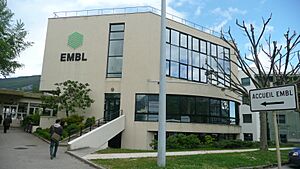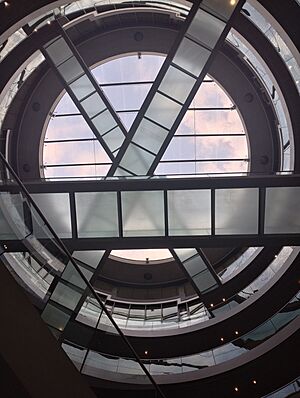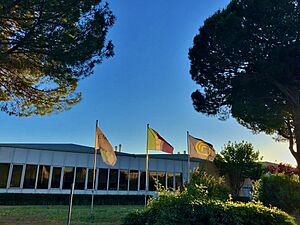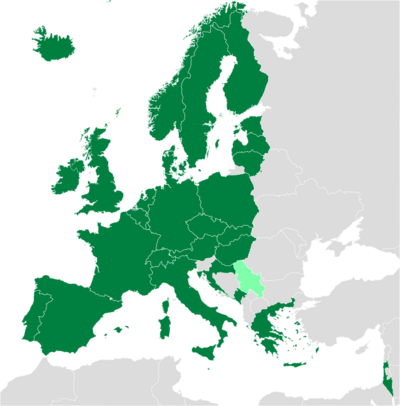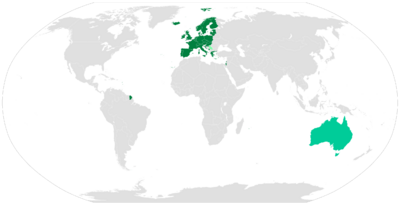European Molecular Biology Laboratory facts for kids

EMBL logo
|
|
| Abbreviation | EMBL |
|---|---|
| Formation | 1974 |
| Type | Research institute |
| Purpose | Basic research |
| Headquarters | Heidelberg, Germany |
| Locations |
|
| Fields | Molecular biology |
|
Membership
|
Full members (29):
Associate member (1):
|
|
Director General
|
Edith Heard |
|
Staff
|
~1800 |
The European Molecular Biology Laboratory (EMBL) is a special group that does molecular biology research. It is supported by many countries. EMBL started in 1974 and gets its money from public research funds in these countries. Over 110 different research teams work at EMBL, studying all kinds of things in molecular biology.
EMBL has six main locations. The main lab is in Heidelberg, Germany. Other labs are in Barcelona (Spain), Grenoble (France), Hamburg (Germany), Hinxton (England), and Rome (Italy). Scientists at EMBL do important research and also help train new scientists. They also create new tools and ways to study biology. Israel is the only full member country outside of Europe.
Contents
History of EMBL
The idea for EMBL came from scientists like Leó Szilárd, James Watson, and John Kendrew. They wanted to create a big international research center. They hoped it would be like CERN, which studies physics. Their goal was to make Europe a leader in molecular biology, a field where America was very strong.
John Kendrew was the first leader of EMBL until 1982. After him, Lennart Philipson took over. Later, Fotis Kafatos led EMBL from 1993 to 2005. Iain Mattaj was the director from 2005 to 2018. In January 2019, Edith Heard became the fifth director. She was the first woman to hold this important job.
In January 2022, Edith Heard announced a new five-year science plan called "Molecules to Ecosystems." Matthias Hentze and Peer Bork also served as interim directors.

What EMBL Researches
Each EMBL location focuses on a different area of science. The EMBL-EBI in England is a major center for bioinformatics. This means they work with huge amounts of biological data. They create and keep many science databases that anyone can use for free.
At the Grenoble and Hamburg sites, scientists mainly study structural biology. This is about understanding the 3D shapes of tiny parts of cells. The EMBL Rome site studies epigenetics and neurobiology. Epigenetics looks at how genes are turned on or off. Neurobiology studies the brain and nervous system.
Scientists at EMBL Barcelona explore how tissues and organs work. They also study how they develop, both when healthy and when sick. At the main lab in Heidelberg, there are groups studying cell biology and biophysics. They also research developmental biology (how living things grow). Other areas include genome biology and computational biology.
Many important discoveries have happened at EMBL. For example, Christiane Nüsslein-Volhard and Eric Wieschaus studied how fruit flies develop. They won the Nobel Prize in Physiology or Medicine in 1995 for their work. In the early 1980s, Jacques Dubochet and his team at EMBL created a new way to look at tiny structures. This method is called cryogenic electron microscopy. He won the 2017 Nobel Prize in Chemistry for this amazing invention.
Scientific Help for Researchers
EMBL's main goal is to offer advanced tools and services to other scientists. These services include special equipment for structural biology, imaging, and DNA sequencing. These are available at its five European sites.
In 2021, EMBL opened a new center in Heidelberg. It's called the EMBL Imaging Centre. This center has the newest light and electron microscopes. Scientists from all over the world can visit and use these amazing tools. They also get expert advice and access to new technologies.
Training Future Scientists
Training is a very important part of what EMBL does. The EMBL International PhD Programme (EIPP) is their main training program. About 200 students are part of this program. Since 1997, EMBL has been able to give out its own degrees. However, students usually get their degrees from partner universities.
EMBL also has programs for scientists who have already finished their PhDs. One of these is the EMBL Interdisciplinary Postdoctoral programme (EIPOD). There is also a Visitor Programme for scientists who want to come and learn.
EMBL Advanced Training Centre
In March 2010, the EMBL Advanced Training Centre (ATC) opened in Heidelberg. This building looks like a double helix, which is the shape of DNA. It hosts science conferences, talks, and training courses. It also has special labs and lecture halls for learning.
The ATC is also home to EMBL's European Learning Lab for the Life Sciences (ELLS). ELLS helps train high school teachers. They learn about the newest discoveries in molecular biology. ELLS also has programs to teach students about science.
Science and Society
EMBL also has a program called "Science and Society." This program organizes events and activities for everyone. It helps the public and scientists learn about important questions in life science research.
Member Countries
EMBL is currently supported by 29 full member countries. It also has one associate member country and two prospect member countries.
| Member states | Year of joining |
|---|---|
| 1974 | |
| 1990 | |
| 2006 | |
| 2014 | |
| 1974 | |
| 2023 | |
| 1984 | |
| 1974 | |
| 1974 | |
| 1984 | |
| 2017 | |
| 2005 | |
| 2003 | |
| 1974 | |
| 1974 | |
| 2024 | |
| 2019 | |
| 2007 | |
| 2016 | |
| 2018 | |
| 1974 | |
| 1985 | |
| 2019 | |
| 1998 | |
| 2018 | |
| 1986 | |
| 1974 | |
| 1974 | |
| 1974 | |
| Prospect member state | |
| 2024 | |
| 2023 | |
| Associate member state | |
| 2008 | |
| Former associate member state | |
| 2014–2020 |
See also
- European Molecular Biology Organization
- European Genome-phenome Archive
 | Audre Lorde |
 | John Berry Meachum |
 | Ferdinand Lee Barnett |


